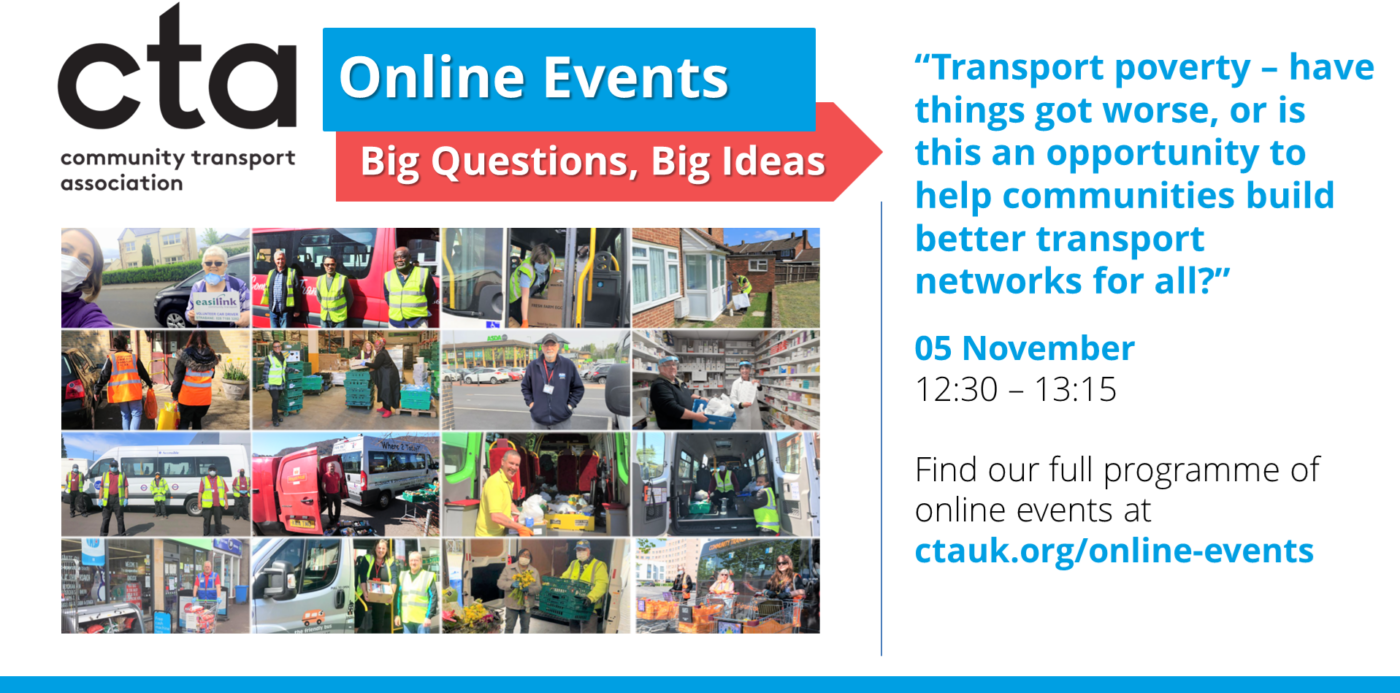-

Online Event Recap: Big Questions, Big Ideas: Transport Poverty
-
12th November 2020
-
-
by Suzanne Lau
Policy Executive
From October to December, CTA is holding a series of free online events looking at important topics for the community transport sector, and what life might look like for our members over the next few months and into 2021. Throughout lock-down, our online events, from our weekly member drop in calls to our Recovery and Restart webinar in July, have been great ways for members to connect with each other and the CTA team in what has been a challenging and uncertain time. Your feedback has been that you wanted to see more opportunities for online events looking at the important topics and issues facing the community transport sector at the moment.
You can find our full programme of events here.
On Thursday 05 November, we held our second Big Questions Big Ideas event. For this session we discussed the issue of transport poverty – specifically, whether coronavirus has entrenched transport inequality or created an opportunity to help communities to rebuild transport networks in a more resilient way.
Presenting their perspectives on the matter, we had an outstanding panel. Kicking us off was Dr Karen Lucas, Professor of Human Geography at the University of Manchester and a world-leading expert on social justice in transport. Karen offered an academic insight on the issue, leading us through different ways of defining transport poverty and outlining regional and class disparities in transport access, which in turn create inequality in people’s access to services and goods. Highlighting one of the key causes of transport poverty, Karen declared that we as individuals do not have enough say in our transport networks – by contrast, community transport works to include users’ voices and centres the needs of their passengers in all elements of service.
These points were seamlessly reinforced by Silviya Barrett, Head of Policy, Research and Projects at the Campaign for Better Transport, where she works to make high quality, affordable and sustainable transport available to all. Silviya powerfully asserted that ‘sustainable transport is a social justice issue’, and demonstrated the ways in which the pandemic has exacerbated existing transport inequalities. Silviya also articulated her perspective on how public transport could recover going forward, focusing on connectivity, reliability and affordability.
Rounding up the panellist’s presentations, we had Gordon McCullough, CEO of the Research Institute of Disabled Consumers, who provided views representing the perspective of disabled passengers. Gordon poignantly stated that ‘disability intersects with everything to do with transport poverty’ – a point that many of our members and service users would agree with – and set out the importance of building the insights of people with disabilities into transport systems from the outset, rather than as an afterthought – a policy priority often underlined here at CTA. Gordon also helpfully shared RIDC’s findings that 52% of disabled passengers are worried about returning to public transport – a trend echoed by our recent poll created in collaboration with Disability Equality Scotland. It was particularly interesting to hear that disabled people’s main concern was others’ behaviours on board shared transport, with regard to masks and PPE usage, as well as general cleanliness, corroborating Silviya’s discussion about eroded confidence to travel.
The question posed to the panel on how, in light of the difficulties facing communities and individuals across the UK, we might connect with those who may have become harder to reach over the pandemic, generated fascinating debate between the panellists. Gordon emphasised the importance of reaching out to neighbours and community members, while Karen and Silviya engaged in a heated conversation surrounding government messaging and the role of local authorities in addressing problems of transport poverty. While it was agreed that local authorities should be more empowered to create localised solutions – as CTA also advocate – it was equally recognised that empowerment can be undermined by a skills and funding gap in local authorities, and digital exclusion for many passengers that further inhibits transport access. Meanwhile, the need for, as Karen labelled it, ‘a proper mobility accessibility audit’, was roundly applauded.
With such fascinating discussion, there remained only a few minutes to cover questions from the audience, so it was great that the panellists were happy to stay on beyond the allotted time, where they were able to address questions about gaps in data and knowledge and the research that can be done to overcome this.
The webinar ended with panellists exchanging contact details and promising further discussion between themselves and with attendees, and it was a delight to Chair such a thought-provoking session.
More information
If you’re interested in attending any of our other events, take a look at ctauk.org/online-events and if you have any questions about any of the topics covered in this event, you can get in touch with our advice service at advice@ctauk.org. You can also find our coronavirus guidance for community transport providers at ctauk.org/covid19-guidance.
Event Recording and Slides
-
-
- About CTA
- /
- CTA Membership
- /
- CTWeek24
- /
- Policy & Research
- CommunitySolutions: A Manifesto for the Next UK General Election
- Our Campaigning Guide for Community Transport
- Our Policy Work
- Join Our Mapping England Passenger Survey
- Aneurin Bevan Transport to Health
- Climate Action in Scotland
- conneCTing England Programme
- Mapping Scotland Project
- Mapping Wales
- Mapping England
- Tackling Loneliness in England
- Healthy Communities in Scotland
- /
- Advice & Support
- /
- Training
- /
- Events
- /
